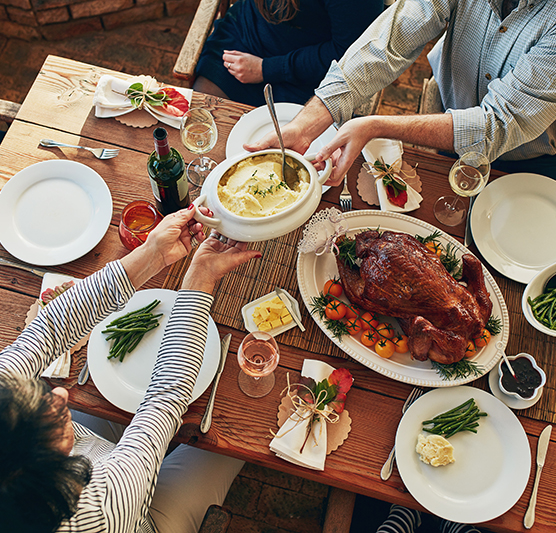During the upcoming months, families and friends will get together to eat, drink, and be merry. For people with diabetes, big meals and busy schedules mean staying aware of maintaining good health. So instead of getting stressed, create routines and priorities that allow you to enjoy yourself. Here are a few tips you can use to help.
1. Take Your Prescriptions
Maintaining healthy routines during the holidays can be a struggle, and most of these guidelines are not diabetes-specific. First: take your prescribed medicine as prescribed. Set daily reminders on your phone. There are many apps to track your prescriptions to make sure you don’t forget. Neglecting your medication can get you off on the wrong foot.
2. Maintain a Regular Eating Schedule
Don’t skip meals! Instead, eat a healthy breakfast, lunch, and dinner, with three to four hours in between. If your meals occur at odd times, bring snacks along to have while you wait. It’s tempting to skip a meal for the sake of a bigger one later, but fluctuating blood sugar can take your mood and energy for a stressful ride.
3. Exercise, Exercise, Exercise
Don’t wait for the New Year to get yourself into action. If you’re eating more than usual, get your body moving, even if it’s only for a walk. Exercise helps lower your blood sugar and insulin resistance, which can help balance any treats you may be indulging in. Also, don’t let the cold weather be an excuse! YouTube has plenty of yoga, bodyweight, and other exercise videos to help keep you active indoors.
4. Prioritize Desserts
That’s right: you don’t need to abstain from special treats completely. You can’t eat every dessert, but if your grandmother makes an incredible apple pie, then make sure to have a slice. Take note of the desserts you love most, and abstain from the rest. Then, by prioritizing desserts or treats, you can stay on top of your blood sugar and indulge safely.
5. What about Alcohol?
Remember to drink responsibly and not excessively. Alcohol still has calories! Avoid high-calorie, high fat, and sugary drinks like egg nog. Be sure to eat and do not drink on an empty stomach. It is also important to be mindful, as, with some medications, you should avoid alcohol. If you are unsure, check with your provider ahead of time.
6. Test Blood Sugar Regularly, but No Need for Compulsion
When it comes to testing your blood sugar, you want to aim for a healthy awareness, not obsessive anxiety. The CDC recommends testing your blood sugar every morning, before every meal, and two hours after every meal. Listen to your physician and follow general guidelines. Note that most people do not need to test that often unless on insulin or A1C is elevated. Once again, it’s always good to speak with your physician or health care provider and follow their instruction. Your healthcare team will work with you to put together an individualized plan. Try putting reminders on your phone or consider using a pillbox to keep everything organized.
7. Portion Control
An excellent guide to portion control is the diabetes plate method. Fill half of your plate with starchy green vegetables, a quarter with lean protein, and a quarter with carb-rich foods. This is a general rule, and you will have the best idea of how your body reacts to different portions of food. Make sure to ask a medical professional if you aren’t sure. Then, use your experience and the guidelines to enjoy a bit of everything!
8. Look Up Diabetes-friendly Recipes
Need a great way to control what goes into your body? Make some dishes yourself. No one is going to look out for you better than you. Consider using sugar substitutes in any sweet recipe to ensure your blood sugar stays in check. The ADA and Diabetes Self Management websites have recipes for every meal, including appetizers and snacks. On Diabetes Self Management alone, there are over 900 recipes. You’ll be able to find something you like. If you don’t have the best culinary skills, consider sending recipes to the head chef.
The holidays are a time of joy for you and your loved ones. Instead of worrying about whether your diabetes will get the best of you this year, plan to be aware and prepared to take care of yourself. With gift-giving, holiday dinners, and the uncle who brings up the strangest topics of conversation, your plate is full. Make sure that diabetes is not one of the stresses interfering with your holiday spirit.

 APPLY ONLINE TODAY!
APPLY ONLINE TODAY!





